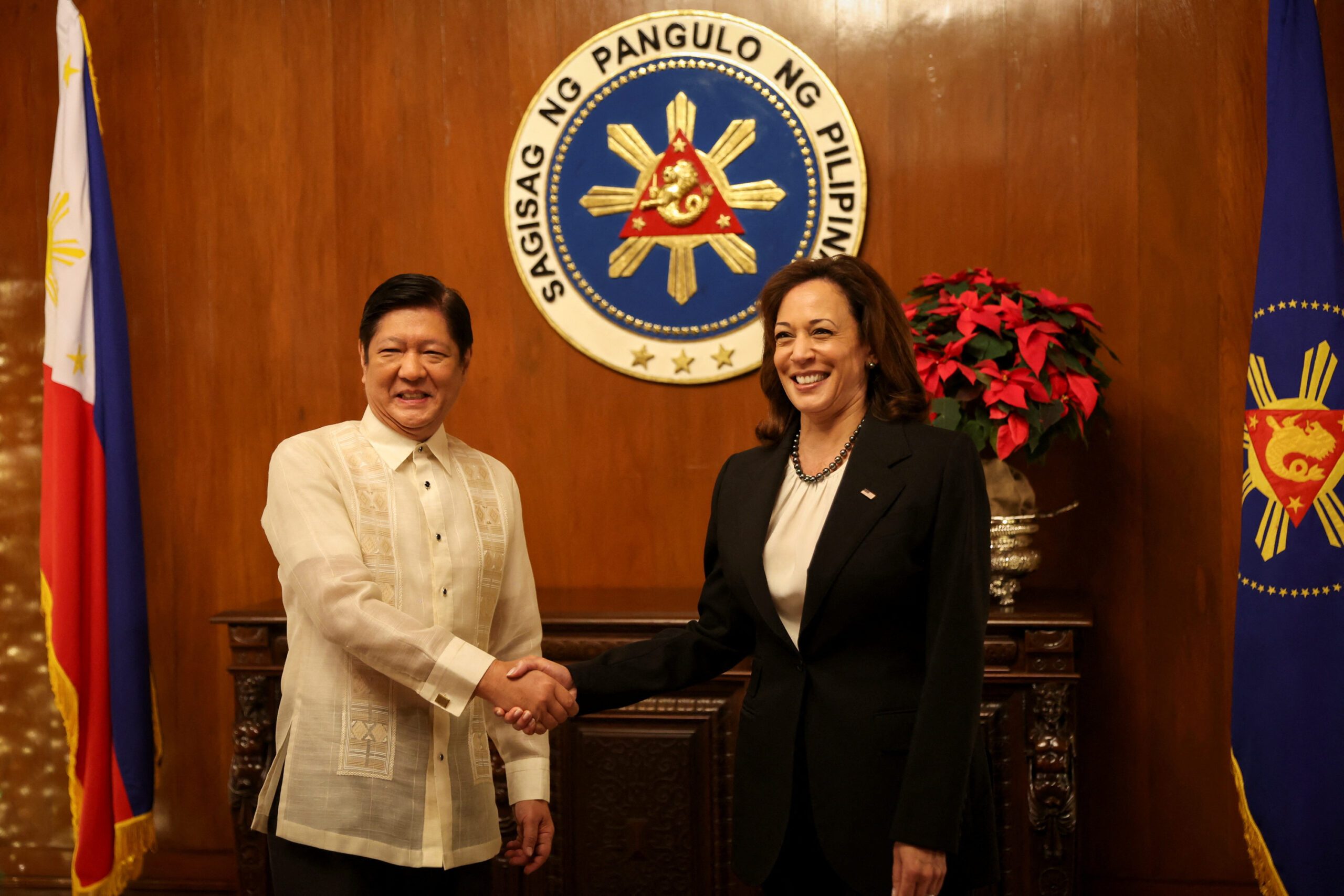SUMMARY
This is AI generated summarization, which may have errors. For context, always refer to the full article.

MANILA, Philippines – United States Vice President Kamala Harris on Monday, November 21, kicked off a visit to Manila by emphasizing that Washington would come to Manila’s defense in the event of an attack in the volatile South China Sea.
“I will say that we must reiterate always that we stand with you in defense of international rules and norms as it relates to the South China Sea,” said Harris during a meeting with Philippine President Ferdinand Marcos Jr. in Malacañang.
Harris added: “An armed attack on the Philippines armed forces, public vessels, or aircraft in the South China Sea would invoke the US’s mutual defense commitments. And that is an unwavering commitment that we have to the Philippines.”
The US Vice President was referring to the 71-year-old Mutual Defense Treaty (MDT) between Manila and Washington. Under the terms of the treaty, both countries vow to come to the other’s defense in event of an attack. The Philippines is among the US’s oldest treaty allies.
Harris’ visit to the Philippines is part of the US effort to strengthen its ties with allies in the Asia Pacific. Harris, like Marcos, was in Bangkok for the Asia-Pacific Economic Cooperation (APEC) Summit while US President Joe Biden travelled to Cambodia for the Association of Southeast Asian Nation Summit and Bali, Indonesia for the G20 Summit.
To coincide with her visit to Manila, the US announced new initiatives between the longtime partners, covering the Enhanced Defense Cooperation Agreement, energy and food security, investments in 5G networks, and training to help upskill Filipino workers.
Marcos and Harris were joined by top Filipino and American officials during the meeting – Harris’ counterpart Philippine Vice President Sara Duterte, Philippine Foreign Affairs Secretary Enrique Manalo, and US Ambassador to Manila MaryKay Loss Carlson, among others.
Before meeting Marcos, Harris and Duterte met at the nearby Augado House. The two VPs talked about education, security, the Marcos administrations’s poverty reduction goals, and job creation.
The red carpet was rolled out for Harris, as she entered Malacañang Palace from that meeting with Duterte .
But it will be her less-than-glamorous events in the island province of Palawan that US “rival” China will pay even closer attention to. Harris will visit Puerto Princesa, which is close to the contested area in the West Philippine Sea or South China Sea.
US naval vessels have time and again passed through the contested South China Sea as part of Washington’s position of freedom of navigation in the contested waterway. China considers these entries of foreign vessels in the area as intrusions.
Marcos has sought to downplay talk that Harris’ Palawan visit would add to tensions between China and the Philippines. Speaking to Harris, he joked that the Vice President was “just going to the resorts and the beaches” in Palawan.
“That is not the life I’ve chosen these days,” Harris responded in jest.
Both the Biden and Marcos administrations have emphasized – repeatedly – the importance of US-Philippine ties.
“I have said [this] many times — I do not see a future for the Philippines that does not include the United States. And that really has — that really has come from the very long relationship that we have had with the US,” said Marcos.
Days before Harris’ Manila visit, Chinese President Xi Jinping warned against the region turning into the “arena” for “big power contest” in a written statement at APEC.
Following Marcos’ bilateral with Xi at Bangkok, China said the two countries should “work together to reject unilateralism and acts of bullying, defend fairness and justice, and safeguard peace and stability in the region.”
Both the US and China have called each other bullies over actions related to the South China Sea. – Rappler.com
1 comment
How does this make you feel?







![[Just Saying] Invoke the Mutual Defense Treaty](https://www.rappler.com/tachyon/2024/06/TL-invoke-mutual-defense-treaty-June-25-2024.jpg?resize=257%2C257&crop_strategy=attention)
![[Rappler’s Best] Divided we fall](https://www.rappler.com/tachyon/2024/06/Divided-we-fall.jpg?resize=257%2C257&crop=363px%2C0px%2C720px%2C720px)

President BBM, instead of talking about beaches and resorts, should have invited U.S. VP Kamala Harris on a joint visit to the contested islands in the West Philippine Sea. Such act should have really and greatly tested both leaders’ commitment to the 71-year-old Mutual Defense Treaty (MDT) between Manila and Washington.